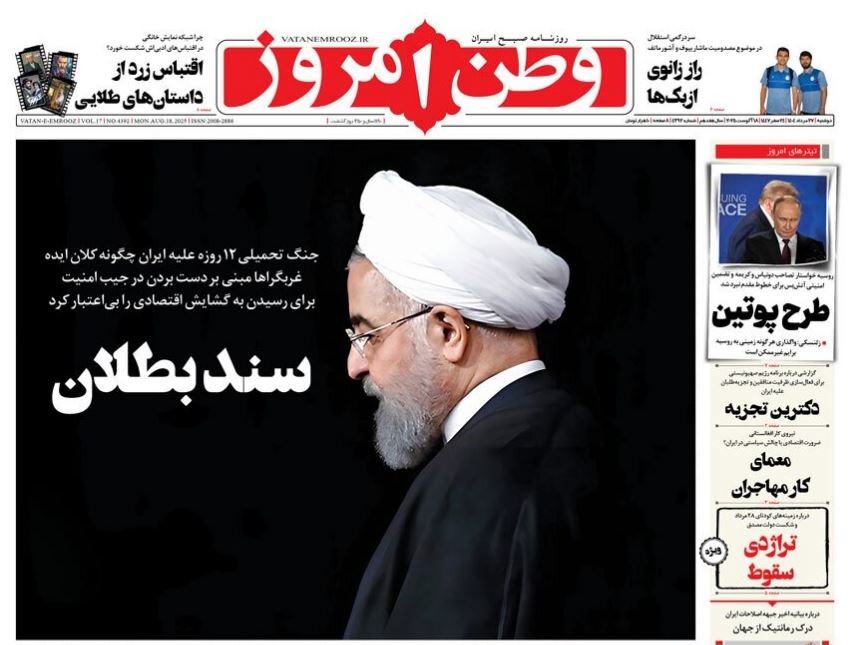China and Russia oppose invoking snapback mechanism

TEHRAN - In an article, Vatan-e-Emrooz addressed China and Russia’s opposition to Europe’s move to activate the snapback mechanism against Iran and wrote: The opposition of China and Russia, as two permanent members of the UN Security Council, has created a significant political capacity against Europe’s move.
These two countries have not only aligned themselves with Iran politically and diplomatically, but have also put forward strong legal arguments against Europe. The coordinated response of China and Russia indicates the formation of a powerful political-legal front against this European move. China has condemned this move as a diplomatic mistake that will lead to an escalation of tensions, and has explicitly called it illegal and questioned Europe’s legitimacy for such a move. This alignment, which is rooted in the two countries’ shared strategic interests with Iran against Western pressure, gives Tehran significant diplomatic weight and puts Europe in a difficult position. The presence of two permanent members of the Security Council on this front poses a serious challenge to any unilateral action by Europe in terms of international legitimacy.
Farhikhtegan: Trump-Putin and its impact on powerful Eastern countries
In an analysis, Farhikhtegan discussed the August 15 meeting between the U.S. and Russian presidents in Alaska, noting: If the United States succeeds in ending the Russia–Ukraine conflict, it will intensify pressure on both Iran and China. Two possible scenarios are envisioned: first, Washington could exert heavy pressure on Iran, resolve the “Iran file,” and then pivot toward China. Alternatively, it could move directly against China. In the short term, U.S. confrontation with Iran would increase pressure on the Islamic Republic, but given the region’s complexities, Washington would soon encounter the depth of its challenges with Tehran. Thus, although Zionist actors want the United States to remain heavily focused on the region, Washington may find the costs of confrontation excessive, prompting it to seek an exit strategy. The U.S.’s primary objectives are to sow division among Eastern powers, apply pressure, and contain them gradually and separately. This ambition is recognized, and the Eastern powers continue cooperating to prevent the implementation of America’s policy.
Sobh-e-No: Lessons of Alaska meeting
Sobh-e-No wrote about the connection between Iran and the Alaska summit. It wrote: The key issue regarding this meeting is its relevance to Iran—its lessons, potential benefits, and possible costs. During the Ukraine war, a Europe weakened in the face of Moscow sought a scapegoat by magnifying the military cooperation between Iran and Russia, thereby increasing pressure on Tehran. This ranged from provoking the 2022 riots and joining U.S. sanctions against Iran to aligning with Israel and Washington in military actions, and even threatening to trigger the snapback mechanism—each move fitting into this broader context. However, recent developments in the South Caucasus and the 12-day war have shown that Russia, for now, does not intend to play a leading role. Its entire focus remains on Ukraine, leaving Iran without a true friend or strategic partner in this struggle, forcing it to safeguard its own interests independently. There is also the risk that Moscow could use the “Iran card” to gain further concessions in the Ukraine conflict. Following the Alaska meeting, former U.S. President Trump once again hinted at the possibility of attacking Iran. These events suggest that the Alaska meeting holds multiple diplomatic lessons for Iran.
Arman-e-Emrooz: Why are Iran and US closer to negotiations than war?
In a commentary, Arman-e-Emrooz argues there are indications that the United States and Iran are taking steps toward negotiations rather than heading for a military confrontation. It wrote: Given the current circumstances, analyses coupled with plenty of evidence show the likelihood of a diplomatic breakthrough between the two countries. Even despite many obstacles, the chances of dialogue are far greater than breakout of a military conflict. There are many reasons that have made diplomacy an inevitable option. The powerful countries, especially the European trio, have repeatedly shown that they are ready to mediate to revive the nuclear agreement or form a new understanding. Pressure from powerful countries have forced the United States to avoid military action that could put its allies in a bind. On the other hand, Iran is facing deep economic problems. This situation is pushing the Iranian government towards negotiations to ease the sanctions pressure. The fact that Iran and the U.S. are aware of the catastrophic consequences of war, like a light in the darkness, illuminates the path of diplomacy. This path is smoother than war, which leads to a dead end.
Leave a Comment